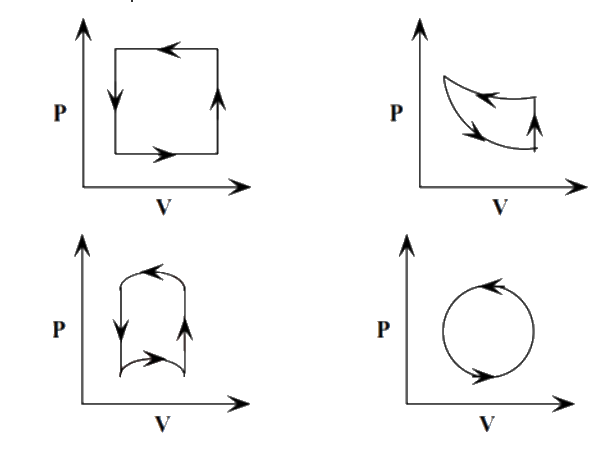Assertion: For an ideal gas in a cyclic process and in an isothermal process change in internal energy is zero.
Reason: In both processes there is no change in temperature.
(a) If both Assertion and Reason are true and the Reason is correct explanation of the Assertion.
(b) If both Assertion and Reason are true but Reason is not the correct explanation of Assertion.
(c) If Assertion is true, but the Reason is false.
(d) If Assertion is false but the Reason is true.
The correct Answer is:A
To solve the question, we need to analyze the assertion and the reason provided:
Assertion: For an ideal gas in a cyclic process and in an isothermal process, the change in internal energy is zero.
Reason: In both processes, there is no change in temperature.
1. Understanding Internal Energy:
- The internal energy (U) of an ideal gas depends only on its temperature. For an ideal gas, the change in internal energy (ΔU) can be expressed as:
ΔU=nCvΔT
where n is the number of moles, Cv is the specific heat capacity at constant volume, and ΔT is the change in temperature.
2. Analyzing the Isothermal Process:
- In an isothermal process, the temperature remains constant (ΔT = 0). Therefore, the change in internal energy is:
ΔU=nCv⋅0=0
- This confirms that for an ideal gas undergoing an isothermal process, the change in internal energy is zero.
3. Analyzing the Cyclic Process:
- In a cyclic process, the system returns to its initial state after completing a cycle. This means that the initial and final states of the system are the same, which implies that the temperature at the beginning and end of the cycle is also the same (ΔT = 0).
- Thus, for a cyclic process, the change in internal energy is also:
ΔU=nCv⋅0=0
- Therefore, the change in internal energy for an ideal gas in a cyclic process is also zero.
4. Conclusion:
- Both the assertion and the reason are correct. The assertion states that the change in internal energy is zero for both processes, and the reason correctly explains that this is due to the fact that there is no change in temperature in both cases.
Final Answer:
- The assertion is true, and the reason is also true. The reason is the correct explanation for the assertion.
Reason: In both processes, there is no change in temperature.
- The internal energy (U) of an ideal gas depends only on its temperature. For an ideal gas, the change in internal energy (ΔU) can be expressed as:
ΔU=nCvΔT
where n is the number of moles, Cv is the specific heat capacity at constant volume, and ΔT is the change in temperature.
- In an isothermal process, the temperature remains constant (ΔT = 0). Therefore, the change in internal energy is:
ΔU=nCv⋅0=0
- This confirms that for an ideal gas undergoing an isothermal process, the change in internal energy is zero.
- In a cyclic process, the system returns to its initial state after completing a cycle. This means that the initial and final states of the system are the same, which implies that the temperature at the beginning and end of the cycle is also the same (ΔT = 0).
- Thus, for a cyclic process, the change in internal energy is also:
ΔU=nCv⋅0=0
- Therefore, the change in internal energy for an ideal gas in a cyclic process is also zero.
- Both the assertion and the reason are correct. The assertion states that the change in internal energy is zero for both processes, and the reason correctly explains that this is due to the fact that there is no change in temperature in both cases.
- The assertion is true, and the reason is also true. The reason is the correct explanation for the assertion.
Topper's Solved these Questions
- LAWS OF THERMODYNAMICSBOOK - DC PANDEY ENGLISHCHAPTER - LAWS OF THERMODYNAMICSEXERCISE - Level 1 Objective
14 Videos
- LAWS OF THERMODYNAMICSBOOK - DC PANDEY ENGLISHCHAPTER - LAWS OF THERMODYNAMICSEXERCISE - Level 1 Objective Questions
1 Videos
- LAWS OF THERMODYNAMICSBOOK - DC PANDEY ENGLISHCHAPTER - LAWS OF THERMODYNAMICSEXERCISE - Exercise 21.4
8 Videos
- LAWS OF MOTIONBOOK - DC PANDEY ENGLISHCHAPTER - LAWS OF MOTIONEXERCISE - Medical entrances gallery
39 Videos
- MAGNETIC EFFECT OF CURRENT AND MAGNETISMBOOK - DC PANDEY ENGLISHCHAPTER - MAGNETIC EFFECT OF CURRENT AND MAGNETISMEXERCISE - Integer type Questions
10 Videos
Similar Questions
Knowledge Check
Assertion : In an isothemal expansion the gas absorbs heat and does work .
Reason: In an isothermal process there is no change in internal energy of an ideal gas.ABoth assertion and reason are true and reason is the correct explanation of assertionBBoth assertion and reason are true but reason is not the correct explanation of assertionCAssertion is true but reason is falseDBoth assertion and reason are false.
Change in internal energy in an isothermal process for ideal gas is
View SolutionTotal internal energy of an ideal gas remains constant in isothermal process.
View SolutionIf heat is supplied to an ideal gas in an isothermal process.
View SolutionWhat will be nature of change in internal energy in case of processes shown below ?

View SolutioniIn isochoric process change ib internal energy of the gas in △ T temperature rise for 2 mole is
View SolutionWhen the gas is ideal and process is isothermal, then
View SolutionWhen the gas is ideal and process is isothermal, then
View Solution
